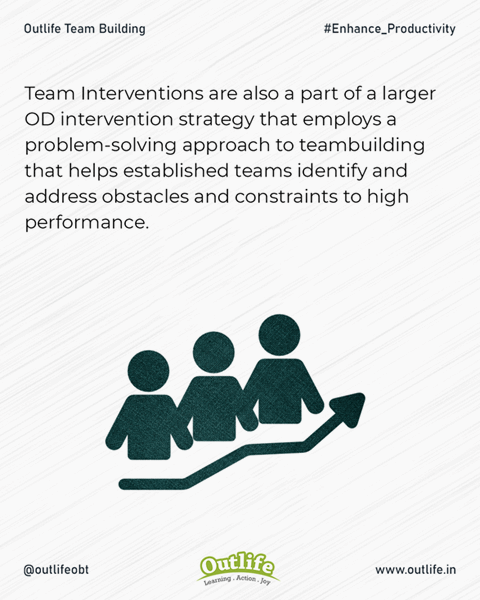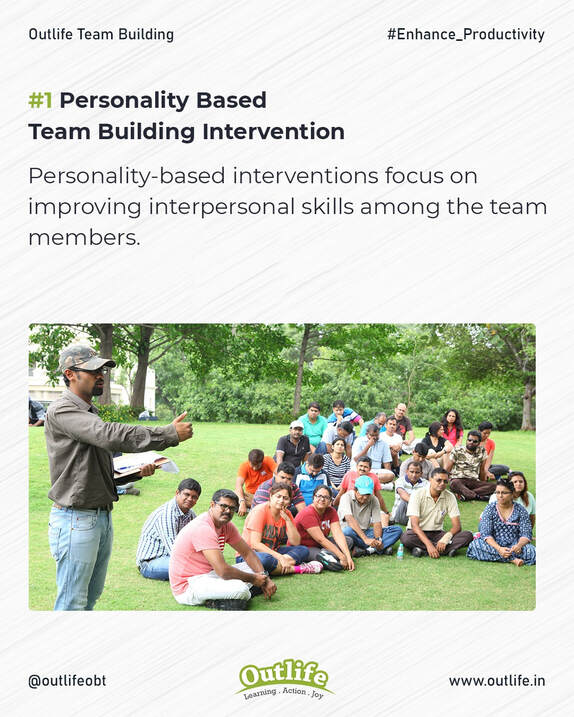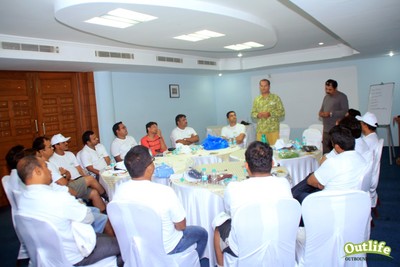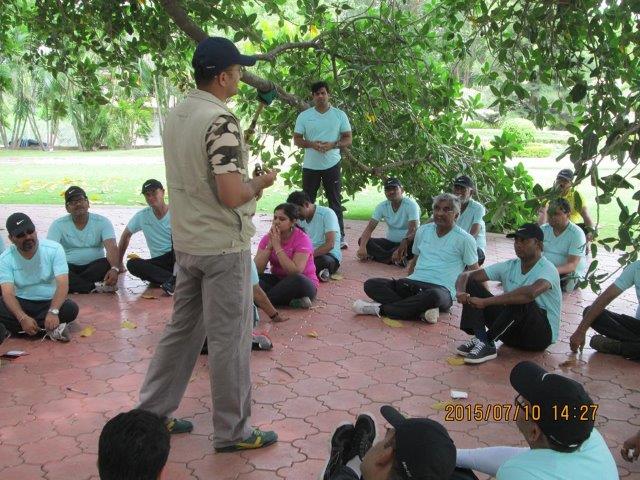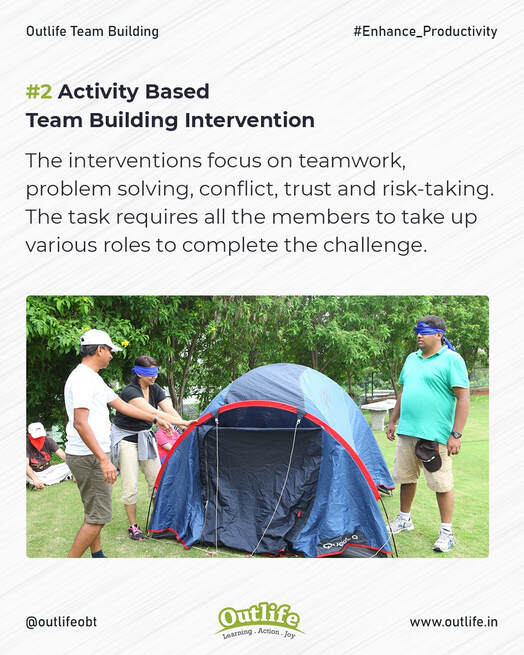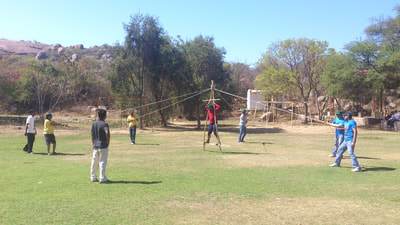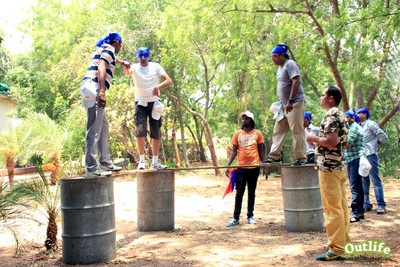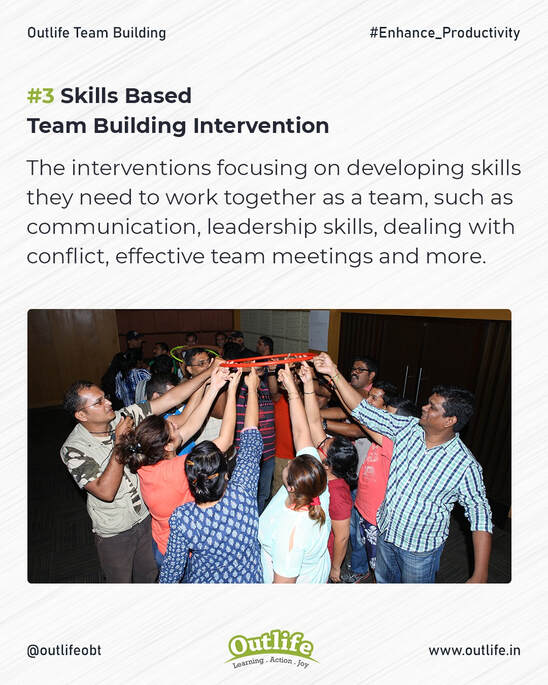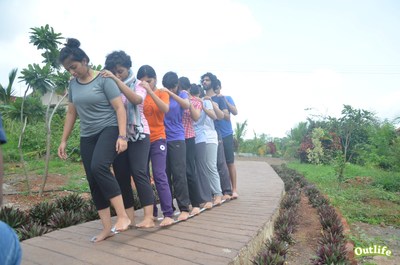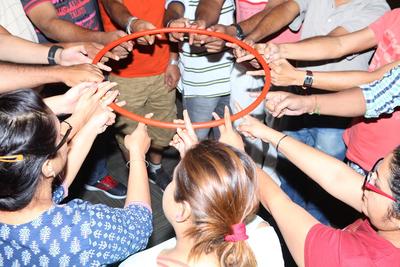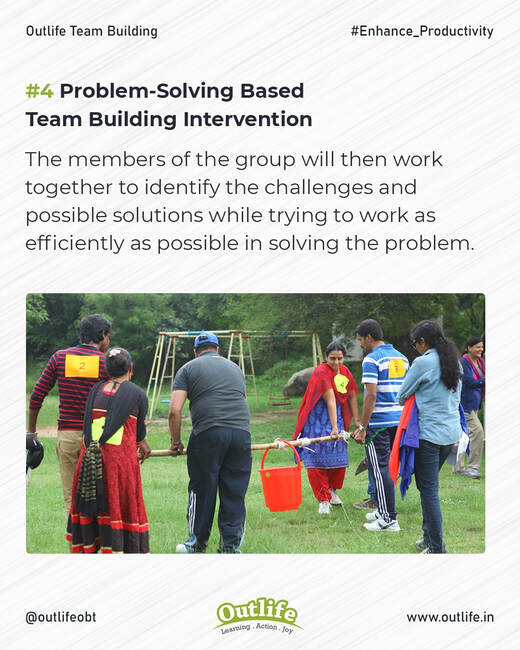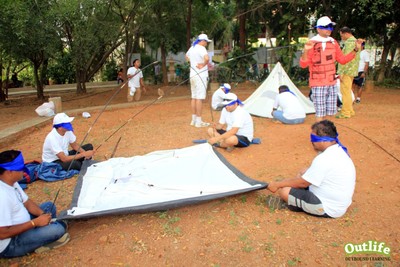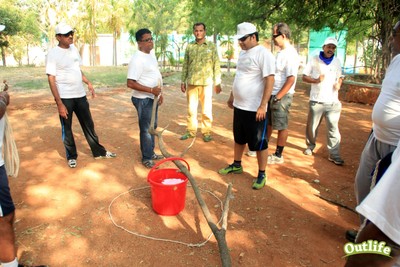Team Building Interventions
|
Team building interventions help to enhance relationships and performance among participants who come together under a common objective as a team and typically include skill development training, team activities and exercises.
A team building intervention is a planned and structured process aiming to improve a team's performance and effectiveness. A team intervention can include activities and exercises designed to improve communication, trust, and collaboration among team members, as well as strategies for addressing any issues or conflicts that may impact the team's performance. Team building interventions are a subset of the larger team development intervention, OD initiatives and include various tools and team building processes like human group processes, skill-based workshops, psychometric instruments, team building exercises and team building activities that are designed to improve teamwork and team performance. These team activities aim to improve interpersonal relations, clarify team members roles and responsibilities, and solve tasks and interpersonal conflicts that affect overall team functionality at the workplace. One of the most potent reasons for the team to undergo team building intervention is to improve team cooperation, team collaboration, team cohesion and team co-creation to achieve high-performance results. Understanding team building interventionsTeam building interventions are purposeful actions and strategies designed to enhance the cohesiveness and performance of a team. These interventions encompass a wide array of activities, exercises, and initiatives aimed at improving communication, trust, collaboration, and overall effectiveness within a team.
Understanding the underlying principles of team building interventions is crucial for leaders and organizations seeking to create an environment where teams can thrive and achieve sustainable success. By gaining insight into the foundational concepts of team dynamics and the science behind effective interventions, it becomes possible to implement strategies that yield lasting results. Successful team building interventions have a profound impact on the overall dynamics and performance of a team. When executed thoughtfully and strategically, these interventions have the potential to foster a sense of unity, trust, and purpose among team members. Furthermore, they can lead to improved communication, enhanced problem-solving abilities, and increased productivity. The impact of successful team building interventions extends beyond mere camaraderie and can significantly contribute to the achievement of organizational goals and objectives. By recognizing the transformative power of well-executed team building interventions, leaders and organizations can harness these strategies to drive long-term success and competitive advantage. Unleashing Team Potential: The Power of Team Building InterventionsUnlocking the full potential of a team is a complex and multifaceted endeavor, but with the right strategies in place, it's entirely achievable. Effective team building interventions are the cornerstone of harnessing the collective talents and skills within a team and propelling them toward success.
In today's fast-paced and competitive business landscape, the significance of fostering a cohesive and high-performing team cannot be overstated. From fostering open communication and trust to cultivating a culture of collaboration and innovation, the impact of well-executed team building interventions reverberates across every aspect of an organization. In this article, we delve deep into the strategies and approaches that underscore the power of team building interventions. Whether you're a team leader, HR professional, or an executive aiming to elevate your team's performance, understanding and implementing these interventions can be the catalyst for unleashing your team's full potential. Join us as we explore the transformative impact of effective team building interventions and the pivotal role it plays in driving organizational success. Team Building Interventions in ODHuman Process Interventions are part of Organisational Development (OD) Initiatives that include team building interventions. The team interventions are structured and planned team activities designed to improve the teams effectiveness through their participation in the Team Activities
Team building interventions utilize several approaches to help team members from diverse backgrounds, cultures, values, education levels, attitudes, and disciplines work together toward the organization's values and goals. |
Contact us
|
Team Interventions are a part of a larger OD intervention strategy that employs a problem-solving approach to teambuilding that helps established teams identify and address obstacles and constraints to high performance.
These are likely to be more reactive than proactive, designed to address a problem that a team is experiencing. For example, members on a team may experience role conflict that impedes their performance, and they may need an intervention to sort through the confusion.
Team building interventions also improve the team members’ feelings and team interactions, thereby improving relationships and trust in the entire team.
These are likely to be more reactive than proactive, designed to address a problem that a team is experiencing. For example, members on a team may experience role conflict that impedes their performance, and they may need an intervention to sort through the confusion.
Team building interventions also improve the team members’ feelings and team interactions, thereby improving relationships and trust in the entire team.
Types of team building interventions
Team building interventions come in various forms, each tailored to address specific aspects of team dynamics . These interventions can be customized to suit the unique needs and challenges of a particular team or organization. The key is to select interventions that align with the team's goals, values, and areas for improvement, ensuring a targeted and impactful intervention.
The Four Different type of Team Building intervention methods are :
Team building intervention strategies help teams avoid or recover from pitfalls of internal competition, conflict, lack of commitment, lack of responsibility and accountability and poor team results.
The Four Different type of Team Building intervention methods are :
- Personality Based Team Building
- Activity-Based Team Building
- Skills Based Team Building
- Problem Solving Based Team Building
Team building intervention strategies help teams avoid or recover from pitfalls of internal competition, conflict, lack of commitment, lack of responsibility and accountability and poor team results.
Personality Based Team Building Intervention method
Personality-Based Team Building uses a personality or psychometric questionnaire such as the Myers-Briggs Personality Type, Insights Team Dynamics, Belbin Team Roles, Enneagram or DISC assessments. Personality-based interventions focus on improving interpersonal skills among the team members.
The results are communicated to each team member and, in some instances, the entire team to help members understand and appreciate their own and their teammates' personalities and interpersonal styles. Ideally, this understanding leads to better communication and improved team effectiveness.
Members may also do role plays and participate in team building activities to relate and reflect on their personality type and how they can effectively communicate and build good relationships with other team members.
The results are communicated to each team member and, in some instances, the entire team to help members understand and appreciate their own and their teammates' personalities and interpersonal styles. Ideally, this understanding leads to better communication and improved team effectiveness.
Members may also do role plays and participate in team building activities to relate and reflect on their personality type and how they can effectively communicate and build good relationships with other team members.
Activity Based Team Building Intervention method
Activity-Based Team Building involves fulfilling challenging tasks in an outdoor environment, such as group outdoor and adventure activities. The team members participate in physical challenges, such as group obstacles, physical challenges, canoeing or hiking.
The interventions focus on teamwork, problem solving, conflict, trust and risk-taking. The task requires all the members to take up various roles to complete the challenge.
The behaviours are brought out to awareness during the sharing phase and debriefing phase, and parallels identified at the workplace that is similar to the challenges face by the team members. The learning is transferred to the workplace, thus creating new relationships between the team members to work efficiently together.
The interventions focus on teamwork, problem solving, conflict, trust and risk-taking. The task requires all the members to take up various roles to complete the challenge.
The behaviours are brought out to awareness during the sharing phase and debriefing phase, and parallels identified at the workplace that is similar to the challenges face by the team members. The learning is transferred to the workplace, thus creating new relationships between the team members to work efficiently together.
Skills Based Team Building Intervention method
Skills-Based Team Building Skills engages team members in a workshop style intervention that combines training content and activities focusing on developing skills they need to work together as a team, such as communication, leadership skills, dealing with conflict, effective team meetings and more.
These skill-based workshops allow members to learn and practice teamwork efficiently.
With the development of these team skills, the teams create a more effective team if the skills acquired are applied in the workplace. These interventions are presented as a workshop with training content and team activities in which all members participate and develop action plans for practicing the needed skills.
These skill-based workshops allow members to learn and practice teamwork efficiently.
With the development of these team skills, the teams create a more effective team if the skills acquired are applied in the workplace. These interventions are presented as a workshop with training content and team activities in which all members participate and develop action plans for practicing the needed skills.
Problem Solving Based Team Building Intervention method
Problem-solving skills are essential for navigating challenges and achieving goals as a team, and problem-solving team building activities are designed to develop critical thinking, creativity, and resilience among team members.
These activities provide opportunities for teams to collaborate, think strategically, and tackle complex problems in a supportive and engaging environment. Whether it's a collaborative puzzle challenge, a strategic planning simulation, or a real-world problem-solving task, problem-solving activities offer valuable experiences that enhance teamwork and build problem-solving capabilities within the team.
In addition to structured challenges, problem-solving team building activities can also include strategic planning games, interactive problem-solving workshops, and group activities that require teams to navigate obstacles and achieve specific objectives. These activities offer team members the opportunity to test their problem-solving abilities, explore different approaches to complex challenges, and develop a shared mindset of resilience and innovation that strengthens the problem-solving capabilities of the team.
Problem Solving-Based Team Building is frequently executed at an offsite event but can also be done indoors. This type of team building is aimed at helping the team unravel and solve specific problems.
The members of the group will then work together to identify the challenges and possible solutions while trying to work as efficiently as possible in solving the problem.
The facilitator's job is to help the team explore and understand the problem in order to find a solution. Problem solving retreats are the most common form of team building intervention because parallels are drawn between the activity and work. The transfer of learning is immediately applied to the team's ongoing work.
These activities provide opportunities for teams to collaborate, think strategically, and tackle complex problems in a supportive and engaging environment. Whether it's a collaborative puzzle challenge, a strategic planning simulation, or a real-world problem-solving task, problem-solving activities offer valuable experiences that enhance teamwork and build problem-solving capabilities within the team.
In addition to structured challenges, problem-solving team building activities can also include strategic planning games, interactive problem-solving workshops, and group activities that require teams to navigate obstacles and achieve specific objectives. These activities offer team members the opportunity to test their problem-solving abilities, explore different approaches to complex challenges, and develop a shared mindset of resilience and innovation that strengthens the problem-solving capabilities of the team.
Problem Solving-Based Team Building is frequently executed at an offsite event but can also be done indoors. This type of team building is aimed at helping the team unravel and solve specific problems.
The members of the group will then work together to identify the challenges and possible solutions while trying to work as efficiently as possible in solving the problem.
The facilitator's job is to help the team explore and understand the problem in order to find a solution. Problem solving retreats are the most common form of team building intervention because parallels are drawn between the activity and work. The transfer of learning is immediately applied to the team's ongoing work.
A good team building program will combine all types of team building intervention methods and is usually based on the methodology of experiential learning and adult learning principles.
Such wholesome team building interventions focus on all aspects of the team needs, namely team vision, team relations, team goals, team roles and team processes to build an efficient and high-performance team.
Team Building interventions include a skilled and experienced facilitator to conduct the activities and process the experiences to enable the transfer of learning to the workplace. Without a facilitator, the effectiveness and impact of the team building session may not be fully effective.
Such wholesome team building interventions focus on all aspects of the team needs, namely team vision, team relations, team goals, team roles and team processes to build an efficient and high-performance team.
Team Building interventions include a skilled and experienced facilitator to conduct the activities and process the experiences to enable the transfer of learning to the workplace. Without a facilitator, the effectiveness and impact of the team building session may not be fully effective.
Examples of Team Building Interventions
Team-building interventions can take many forms, from workshops and training sessions to team-building retreats or offsite activities. The goal is to help the team work together more effectively and achieve better results. Overall, the goal of team building interventions is to improve communication, collaboration, and trust among team members to increase productivity and overall team effectiveness.
Some examples of team-building interventions would be
Adventure and Outdoor Activities: These interventions involve activities such as rock climbing, hiking, ropes course, and other outdoor challenges that encourage team members to work together to achieve a common goal.
Communication and Problem-Solving Exercises: These interventions focus on improving communication and problem-solving skills within the team. Examples include role-playing scenarios, case studies, and brainstorming sessions.
Team Building Games and Activities: These interventions use fun and interactive games and activities to build team cohesion and improve teamwork. Examples include scavenger hunts, trust-building exercises, and team-building challenges.
Leadership development: This type of intervention focuses on developing leadership skills among team members, including decision-making, communication, and conflict resolution.
Team Coaching and mentoring: This type of intervention may involve a coach or mentor working with the team to identify areas of improvement and develop strategies for addressing them.
Team Retreats and Offsites: These interventions involve taking the team out of the office for a day or longer to focus on team-building activities and goal-setting. This can include team-building exercises, leadership training, and brainstorming sessions.
Diversity and Inclusion Training: These interventions focus on fostering a more inclusive and diverse work environment. They may include workshops on unconscious bias, cultural sensitivity, and communication strategies to improve collaboration among team members from different backgrounds.
Volunteer and Community Service: These interventions involve team members working together on a volunteer or community service project. This can be a great way to build teamwork and develop a sense of purpose among team members.
Virtual team-building: With the rise of remote work, virtual team-building interventions have become popular. These include online activities, webinars, and virtual workshops designed to improve communication and collaboration within virtual teams.
Some examples of team-building interventions would be
Adventure and Outdoor Activities: These interventions involve activities such as rock climbing, hiking, ropes course, and other outdoor challenges that encourage team members to work together to achieve a common goal.
Communication and Problem-Solving Exercises: These interventions focus on improving communication and problem-solving skills within the team. Examples include role-playing scenarios, case studies, and brainstorming sessions.
Team Building Games and Activities: These interventions use fun and interactive games and activities to build team cohesion and improve teamwork. Examples include scavenger hunts, trust-building exercises, and team-building challenges.
Leadership development: This type of intervention focuses on developing leadership skills among team members, including decision-making, communication, and conflict resolution.
Team Coaching and mentoring: This type of intervention may involve a coach or mentor working with the team to identify areas of improvement and develop strategies for addressing them.
Team Retreats and Offsites: These interventions involve taking the team out of the office for a day or longer to focus on team-building activities and goal-setting. This can include team-building exercises, leadership training, and brainstorming sessions.
Diversity and Inclusion Training: These interventions focus on fostering a more inclusive and diverse work environment. They may include workshops on unconscious bias, cultural sensitivity, and communication strategies to improve collaboration among team members from different backgrounds.
Volunteer and Community Service: These interventions involve team members working together on a volunteer or community service project. This can be a great way to build teamwork and develop a sense of purpose among team members.
Virtual team-building: With the rise of remote work, virtual team-building interventions have become popular. These include online activities, webinars, and virtual workshops designed to improve communication and collaboration within virtual teams.
Designing a successful team building intervention
Sucessful team building interventions are characterized by their ability to create lasting and meaningful change within a team. These strategies go beyond short-term fixes and instead focus on cultivating a culture of continuous improvement, learning, and adaptation.
By implementing suscessful team building interventions, organizations can foster an environment where teams are empowered to navigate challenges, leverage their collective strengths, and achieve enduring success. Sustainable team building interventions may include ongoing training and development programs, mentorship initiatives, and the establishment of clear communication channels and feedback mechanisms. By embedding these strategies into the fabric of the organization, leaders can ensure that team building efforts result in sustainable and transformative outcomes.
The process of designing a successful team building intervention begins with a thorough assessment of the team's current dynamics, strengths, and areas for development. This assessment provides valuable insights that inform the selection of appropriate interventions and the crafting of specific objectives.
Clear and measurable goals are essential for evaluating the success of the intervention. Moreover, involving team members in the design process can enhance their buy-in and commitment to the intervention's success. Whether it's a one-time team-building event or an ongoing series of interventions, the design phase sets the stage for a purposeful and impactful experience that resonates with the team's collective aspirations.
The science behind successful team building interventions is multifaceted and deeply rooted in an understanding of human behavior, group dynamics, and organizational psychology. By comprehensively grasping the impact of successful team building interventions, understanding the psychology behind effective team building, and incorporating long-term strategies into these interventions, organizations and leaders can foster enduring team synergies and accomplishments.
Through the assessment of effectiveness, implementation of sustainable strategies, and measurement of long-term results, teams can achieve sustainable success and create a culture of resilience, collaboration, and high performance.
By implementing suscessful team building interventions, organizations can foster an environment where teams are empowered to navigate challenges, leverage their collective strengths, and achieve enduring success. Sustainable team building interventions may include ongoing training and development programs, mentorship initiatives, and the establishment of clear communication channels and feedback mechanisms. By embedding these strategies into the fabric of the organization, leaders can ensure that team building efforts result in sustainable and transformative outcomes.
The process of designing a successful team building intervention begins with a thorough assessment of the team's current dynamics, strengths, and areas for development. This assessment provides valuable insights that inform the selection of appropriate interventions and the crafting of specific objectives.
Clear and measurable goals are essential for evaluating the success of the intervention. Moreover, involving team members in the design process can enhance their buy-in and commitment to the intervention's success. Whether it's a one-time team-building event or an ongoing series of interventions, the design phase sets the stage for a purposeful and impactful experience that resonates with the team's collective aspirations.
The science behind successful team building interventions is multifaceted and deeply rooted in an understanding of human behavior, group dynamics, and organizational psychology. By comprehensively grasping the impact of successful team building interventions, understanding the psychology behind effective team building, and incorporating long-term strategies into these interventions, organizations and leaders can foster enduring team synergies and accomplishments.
Through the assessment of effectiveness, implementation of sustainable strategies, and measurement of long-term results, teams can achieve sustainable success and create a culture of resilience, collaboration, and high performance.
Structure of a Team Building Intervention
The strucutre of the team building process involves planning, developing and discovering ways that build and sustain members of a team to work with each other collaboratively accross the organisation.
An important aspect of the team building intervention is to incorporate the following points before or in the workshop design.
The Team Intervention then can focus on creating a experience that includes the following structure.
An important aspect of the team building intervention is to incorporate the following points before or in the workshop design.
- Team Vision
- Team Charter
- Organisational, Team and Individual Values;
- Personality Types / Strengths and Weaknesses
- Identifying Team Conflicts and Challenges
- Establishing ways of collaborating within the team and with other Teams / Divisions
The Team Intervention then can focus on creating a experience that includes the following structure.
- Define Interventions Goals: Define the intervention's goals, objectives, team size, and composition, choosing suitable activities and exercises, and determining the location and time.
- Icebreakers: These activities are designed to make team members feel more at ease and to get to know one another better. These activities can be games, puzzles, or any other interactive activity encouraging communication and collaboration.
- Team-building activities: A set of activities and exercises designed to improve specific skills or accomplish particular goals is the core of a group-building intervention. These activities include communication, problem-solving, trust-building, and leadership exercises.
- Reflection and debriefing: It is essential to reflect on each activity and discuss what you have learned.
- Action planning: It is essential to plan for the next steps or actions that team members can take to put the lessons learned into practice.
- Follow-up and evaluation are crucial to apply skills and knowledge effectively.
Debriefing Modes and Processing Team Building Interventions
The focus of team building interventions is to invite change of behavior, mastery of skills that enhance relationships and performance of the team. The observation and debriefing modes employed in team building training workshops are typically for the person (intrapersonal), between persons (interpersonal) and for the group (cohesiveness)
Group Cohesiveness level intervention
Interpersonal level intervention
Intra-personal level intervention
A good team building workshop will include all three debrief modes of interventions depending on the learning objectives and outcomes. A good rule of thumb is to focus 50 % on group cohesiveness, 40 % on interpersonal and 10 % on intra-personal levels.
Group Cohesiveness level intervention
- Here the Focus is on what is happening in the Team.
- It looks at broad interpersonal dynamics affecting the teams cohesiveness
- It looks at the cognitive level conceptual problems and rationally attempts to solve issues as they arise based on agreements or what is fair.
- It focuses on topics that emerge around communication, teamwork, planning, goal achievement, agreements, acceptance and buy-in of ideas, commitment.
- Focuses on enhancing cooperation and collaborative interdependence.
- Interventions at level of cohesiveness are safer to conduct, process and are less volatile.
Interpersonal level intervention
- Here the Focus is on dynamics between individuals (two or more persons of the team)
- Issues are more likely to involve some degree of emotion and feeling.
- Issues that emerge are negativism, cliques, acceptance, trust and safety concerns, recognition and devaluing, peer pressure, fear of being judged.
- Involves perceptions of each other and how it affects behavior between members.
- May involve personal issues between individual members.
- Focus is to enhance relationship and trust..
- A good intervention at the interpersonal level can create a framework within which confrontation can occur without the accompanying bitterness and one that enhances relationship and trust building.
Intra-personal level intervention
- Here the Focus is on what happens within the individual
- Includes personal feelings, thoughts, beliefs, skills and behaviors specific to the individual.
- Issues include fear, safety, trust, self concept, acceptance, feeling neglected or rejected by others or the peer group.
- Focus is to help the individual get better at self awareness and personal mastery.
- Interventions at intra-personal level can include raising awareness to specific behaviors of the individual but not taking it to depth.
- Interventions at this level may require a mentoring and coaching approach than a team building intervention approach
A good team building workshop will include all three debrief modes of interventions depending on the learning objectives and outcomes. A good rule of thumb is to focus 50 % on group cohesiveness, 40 % on interpersonal and 10 % on intra-personal levels.
Impact of team building interventions on organizational success
The impact of team building interventions extends far beyond boosting team morale or improving communication. When implemented effectively, these interventions can significantly enhance organizational success. Teams that have strong interpersonal relationships, effective communication channels, and a deep sense of trust are better equipped to tackle complex projects, navigate conflicts, and innovate.
By building an environment where diverse perspectives are valued, team building interventions pave the way for creative problem-solving and heightened productivity. Furthermore, cohesive teams are more resilient in the face of adversity, leading to increased employee retention and overall organizational stability. The ripple effects of successful team building interventions are felt in improved customer satisfaction, enhanced decision-making processes, and a positive organizational culture.
By building an environment where diverse perspectives are valued, team building interventions pave the way for creative problem-solving and heightened productivity. Furthermore, cohesive teams are more resilient in the face of adversity, leading to increased employee retention and overall organizational stability. The ripple effects of successful team building interventions are felt in improved customer satisfaction, enhanced decision-making processes, and a positive organizational culture.
Measuring the effectiveness of team building interventions
Measuring the long-term results of team building interventions necessitates a strategic and comprehensive evaluation framework. Long-term results encompass sustained improvements in team performance, resilience in the face of challenges, and adaptive capacity in response to changing circumstances.
Key performance indicators, such as project outcomes, client satisfaction scores, and employee retention rates, provide tangible measures of the intervention's enduring impact on the team's effectiveness and cohesion. Tracking the team's growth in terms of skill development, leadership capabilities, and collaborative problem-solving abilities offers insights into the lasting transformation facilitated by the intervention.
Measuring the effectiveness of team building interventions is crucial for gauging their impact and identifying areas for improvement. Utilizing both qualitative and quantitative assessment methods provides a comprehensive understanding of the intervention's outcomes.
Qualitative assessments, such as surveys, interviews, and observations, capture the subjective experiences and perceptions of team members, shedding light on the emotional and relational aspects of the intervention.
Quantitative metrics, including productivity data, team performance indicators, and feedback scores, offer tangible measures of the intervention's impact on key outcomes. By combining these assessment approaches, organizations can gain a holistic view of the intervention's effectiveness, enabling informed decision-making and targeted adjustments to optimize future interventions.
Ongoing assessment and feedback loops create a culture of continuous improvement, ensuring that team building interventions evolve in tandem with the team's changing dynamics and needs.
Key performance indicators (KPIs) such as team productivity, employee satisfaction, communication effectiveness, and project outcomes can provide valuable insights into the intervention's success.
Surveys, feedback sessions, and individual assessments can offer qualitative data that complements quantitative metrics, providing a holistic view of the intervention's influence on team dynamics and performance.
By establishing a robust evaluation framework, organizations can continuously optimize their team building interventions, ensuring that they remain aligned with the evolving needs and aspirations of the team.
Key performance indicators, such as project outcomes, client satisfaction scores, and employee retention rates, provide tangible measures of the intervention's enduring impact on the team's effectiveness and cohesion. Tracking the team's growth in terms of skill development, leadership capabilities, and collaborative problem-solving abilities offers insights into the lasting transformation facilitated by the intervention.
Measuring the effectiveness of team building interventions is crucial for gauging their impact and identifying areas for improvement. Utilizing both qualitative and quantitative assessment methods provides a comprehensive understanding of the intervention's outcomes.
Qualitative assessments, such as surveys, interviews, and observations, capture the subjective experiences and perceptions of team members, shedding light on the emotional and relational aspects of the intervention.
Quantitative metrics, including productivity data, team performance indicators, and feedback scores, offer tangible measures of the intervention's impact on key outcomes. By combining these assessment approaches, organizations can gain a holistic view of the intervention's effectiveness, enabling informed decision-making and targeted adjustments to optimize future interventions.
Ongoing assessment and feedback loops create a culture of continuous improvement, ensuring that team building interventions evolve in tandem with the team's changing dynamics and needs.
Key performance indicators (KPIs) such as team productivity, employee satisfaction, communication effectiveness, and project outcomes can provide valuable insights into the intervention's success.
Surveys, feedback sessions, and individual assessments can offer qualitative data that complements quantitative metrics, providing a holistic view of the intervention's influence on team dynamics and performance.
By establishing a robust evaluation framework, organizations can continuously optimize their team building interventions, ensuring that they remain aligned with the evolving needs and aspirations of the team.
Challenges in implementing team building interventions.
There are numerous challenges companies face when implementing initiatives to build teams. These challenges can include:
Insufficient buy-in: A few team members might be unable to see the benefits of team building exercises and might be hesitant about being part of the activities. This could make it difficult to effectively implement the strategies.
Small Resources: Some organizations have insufficient resources, for example, budget, time, or staff, for group building activities. This makes it difficult to plan and implement the actions effectively.
Different needs and preferences: Different teams could have different preferences and needs in regard to activities for building teams. It can be difficult to design interventions that satisfy the requirements of every team.
Participation and Time Limits: Teams are often busy working in their normal roles, which makes it difficult for them to find time to engage in activities for team building. This can result in low participation and reduced efficacy of the intervention.
bSome team members might be opposed to change and not be ready to explore new methods of team building. This makes it difficult to adopt new methods and could limit their effectiveness.
Insufficient Follow-Up: Without continuous support and following-up, the advantages of team building exercises could be ineffective. It can be difficult to sustain the positive change that is the result of initiatives to build teams without continuous assistance and encouragement.
Organisations can tackle these issues by anticipating them and devising strategies to deal with each. This could include enhancing collaboration and communication, committing resources for team building exercises and modifying the interventions to meet the unique needs of the group, as well as providing continuous assistance and follow-up.
Insufficient buy-in: A few team members might be unable to see the benefits of team building exercises and might be hesitant about being part of the activities. This could make it difficult to effectively implement the strategies.
Small Resources: Some organizations have insufficient resources, for example, budget, time, or staff, for group building activities. This makes it difficult to plan and implement the actions effectively.
Different needs and preferences: Different teams could have different preferences and needs in regard to activities for building teams. It can be difficult to design interventions that satisfy the requirements of every team.
Participation and Time Limits: Teams are often busy working in their normal roles, which makes it difficult for them to find time to engage in activities for team building. This can result in low participation and reduced efficacy of the intervention.
bSome team members might be opposed to change and not be ready to explore new methods of team building. This makes it difficult to adopt new methods and could limit their effectiveness.
Insufficient Follow-Up: Without continuous support and following-up, the advantages of team building exercises could be ineffective. It can be difficult to sustain the positive change that is the result of initiatives to build teams without continuous assistance and encouragement.
Organisations can tackle these issues by anticipating them and devising strategies to deal with each. This could include enhancing collaboration and communication, committing resources for team building exercises and modifying the interventions to meet the unique needs of the group, as well as providing continuous assistance and follow-up.
Best Practices for Team Building Interventions
In conclusion, effective team building interventions are indispensable for unleashing the full potential of teams and driving organizational success. By understanding the importance of these interventions, recognizing common challenges, and leveraging diverse types of interventions, organizations can build a culture of collaboration, resilience, and innovation.
The design and implementation of successful team building interventions, including those tailored for remote teams, are instrumental in nurturing cohesive and high-performing teams. Measuring the effectiveness of these interventions through KPIs and case studies provides valuable insights that inform continuous improvement.
The role of Human resources leadership in championing a collaborative team culture cannot be overstated, as it sets the foundation for enduring success. Embracing the power of effective team building interventions is not just a strategic imperative but a transformative journey toward unlocking the collective potential of teams and propelling them toward extraordinary achievements.
This comprehensive exploration of effective team building interventions provides valuable insights and actionable strategies for individuals and organizations seeking to elevate their team's performance and unleash their full potential. Whether you're a team leader, HR professional, or an executive, incorporating these principles into your team's dynamics can pave the way for sustained success and unparalleled achievements.
The science behind successful team building interventions encompasses a multifaceted approach that integrates evidence-based strategies, long-term perspectives, and continuous assessment. By understanding the key components of successful team building, incorporating long-term strategies, assessing effectiveness, drawing insights from case studies, implementing sustainable strategies, and measuring long-term results, organizations can cultivate enduring team synergies and accomplishments.
The journey toward fostering a successful team dynamic requires a commitment to understanding the psychological dynamics at play, leveraging proven methodologies, and embracing a culture of continuous improvement. Ultimately, sustained success in team building interventions empowers teams to thrive in the face of challenges, collaborate with resilience, and achieve remarkable results that endure beyond the immediate horizon.
Embrace the power of effective team building interventions and embark on a journey of transformation that transcends boundaries and unlocks the boundless potential of your team.
The design and implementation of successful team building interventions, including those tailored for remote teams, are instrumental in nurturing cohesive and high-performing teams. Measuring the effectiveness of these interventions through KPIs and case studies provides valuable insights that inform continuous improvement.
The role of Human resources leadership in championing a collaborative team culture cannot be overstated, as it sets the foundation for enduring success. Embracing the power of effective team building interventions is not just a strategic imperative but a transformative journey toward unlocking the collective potential of teams and propelling them toward extraordinary achievements.
This comprehensive exploration of effective team building interventions provides valuable insights and actionable strategies for individuals and organizations seeking to elevate their team's performance and unleash their full potential. Whether you're a team leader, HR professional, or an executive, incorporating these principles into your team's dynamics can pave the way for sustained success and unparalleled achievements.
The science behind successful team building interventions encompasses a multifaceted approach that integrates evidence-based strategies, long-term perspectives, and continuous assessment. By understanding the key components of successful team building, incorporating long-term strategies, assessing effectiveness, drawing insights from case studies, implementing sustainable strategies, and measuring long-term results, organizations can cultivate enduring team synergies and accomplishments.
The journey toward fostering a successful team dynamic requires a commitment to understanding the psychological dynamics at play, leveraging proven methodologies, and embracing a culture of continuous improvement. Ultimately, sustained success in team building interventions empowers teams to thrive in the face of challenges, collaborate with resilience, and achieve remarkable results that endure beyond the immediate horizon.
Embrace the power of effective team building interventions and embark on a journey of transformation that transcends boundaries and unlocks the boundless potential of your team.
FAQ on Team Building Interventions
What are team building interventions in OD?
Team building interventions are techniques and activities to elevate trust building, performance, and collaboration. Interventions may include skill-based workshops and team building activities and exercises.
What are interventions for team building?
Team building interventions are exercises designed to improve collaboration and resolve group conflicts. These interventions help strengthen group dynamics by addressing team issues in the current system.
What are the Different type of Team Building intervention?
The Different type of Team Building intervention are
Why are team building interventions important?
Team building inteventions include activities that improve communication, planning, motivation, and collaboration in team members. Team activities help the members to see each other differently and connect in a different setting thereby enhancing trust and relationships.
Which OD interventions are most effective? Why?
Team building is the most popular OD intervention. It incluces planned team activities that help an organization's members improve how they accomplish tasks. Team Building is effective as it can simulate real-time behaviors of the team in the activities, which allows learning and taking corrective actions.
What is team building intervention in OD, and why is it important for organizations?
Team building intervention is an essential element of OD (Organizational Development) strategy that aims to improve the functioning of teams within an organization by enhancing their communication, collaboration, and problem-solving skills.
How do team building interventions help improve team dynamics?
Team building interventions can help improve team dynamics by fostering trust, respect, and open communication among team members. By addressing conflicts and enhancing collaboration and problem-solving skills, team building interventions create a more positive and productive work environment.
What are some of the challenges in implementing team building interventions?
Challenges in implementing team building interventions include a lack of buy-in from team members, resistance to change, and difficulty in measuring the effectiveness of the interventions.
What issues can team building interventions help solve?
Interventions to build teams can address issues like communication problems and frequent conflicts, conflict avoidance, low involvement, and the lack of transparency. Interventions for teams can also clarify team members' roles and lead to more efficient interactions on future initiatives. Because team interventions guide employees in healthy team behaviours
When is the best time to hold team building Intervetions?
The best time to conduct an intervention for teams is when the team is experiencing problems with team dynamics like conflicts, underperformance, and lack of communication. Team interventions can be proactive and not just reactive; one does not have to wait for a problem.
What are some of the best practices for successful team building interventions?
Some best practices for successful team building interventions include:
Team building interventions are techniques and activities to elevate trust building, performance, and collaboration. Interventions may include skill-based workshops and team building activities and exercises.
What are interventions for team building?
Team building interventions are exercises designed to improve collaboration and resolve group conflicts. These interventions help strengthen group dynamics by addressing team issues in the current system.
What are the Different type of Team Building intervention?
The Different type of Team Building intervention are
- Personality Based Team Building
- Activity-Based Team Building
- Skills Based Team Building
- Problem Solving Based Team Building
Why are team building interventions important?
Team building inteventions include activities that improve communication, planning, motivation, and collaboration in team members. Team activities help the members to see each other differently and connect in a different setting thereby enhancing trust and relationships.
Which OD interventions are most effective? Why?
Team building is the most popular OD intervention. It incluces planned team activities that help an organization's members improve how they accomplish tasks. Team Building is effective as it can simulate real-time behaviors of the team in the activities, which allows learning and taking corrective actions.
What is team building intervention in OD, and why is it important for organizations?
Team building intervention is an essential element of OD (Organizational Development) strategy that aims to improve the functioning of teams within an organization by enhancing their communication, collaboration, and problem-solving skills.
How do team building interventions help improve team dynamics?
Team building interventions can help improve team dynamics by fostering trust, respect, and open communication among team members. By addressing conflicts and enhancing collaboration and problem-solving skills, team building interventions create a more positive and productive work environment.
What are some of the challenges in implementing team building interventions?
Challenges in implementing team building interventions include a lack of buy-in from team members, resistance to change, and difficulty in measuring the effectiveness of the interventions.
What issues can team building interventions help solve?
Interventions to build teams can address issues like communication problems and frequent conflicts, conflict avoidance, low involvement, and the lack of transparency. Interventions for teams can also clarify team members' roles and lead to more efficient interactions on future initiatives. Because team interventions guide employees in healthy team behaviours
When is the best time to hold team building Intervetions?
The best time to conduct an intervention for teams is when the team is experiencing problems with team dynamics like conflicts, underperformance, and lack of communication. Team interventions can be proactive and not just reactive; one does not have to wait for a problem.
What are some of the best practices for successful team building interventions?
Some best practices for successful team building interventions include:
- Focusing on the team's needs and goals
- Involve all stakeholders in the planning.
- Providing clear communication and expectations
- Encouraging active participation and engagement
- Following up with feedback and evaluation
- Periodically Improve and adapt the interventions to meet changing team dynamics.
How to reference this article:
Diyanat Ali, Team Building Interventions - Outlife
https://www.outlife.in/team-building-interventions.html
Diyanat Ali, Team Building Interventions - Outlife
https://www.outlife.in/team-building-interventions.html
Other Team Development Interventions
Team Development has variety of interventions based on the needs of the team. some of the other interventions are
1. Cross Functional Team Development
2. Team Coaching
3. High Performance Teams
4. Team Building Programs

